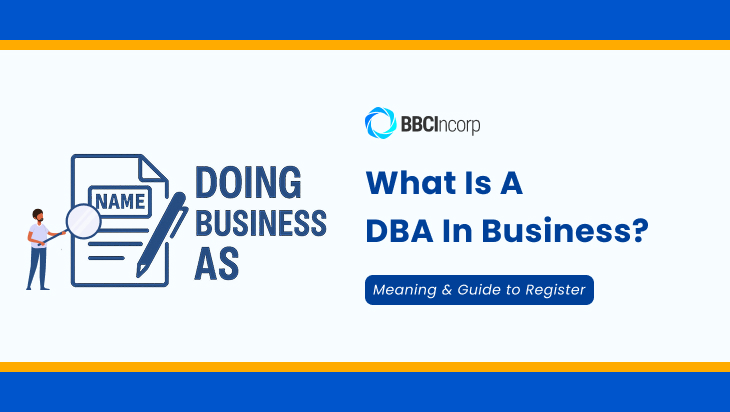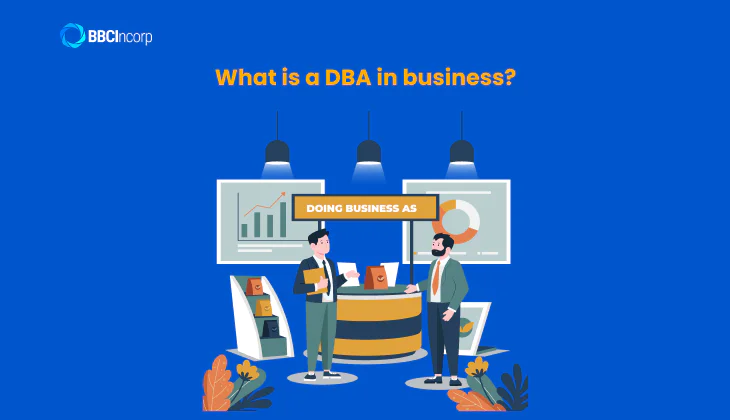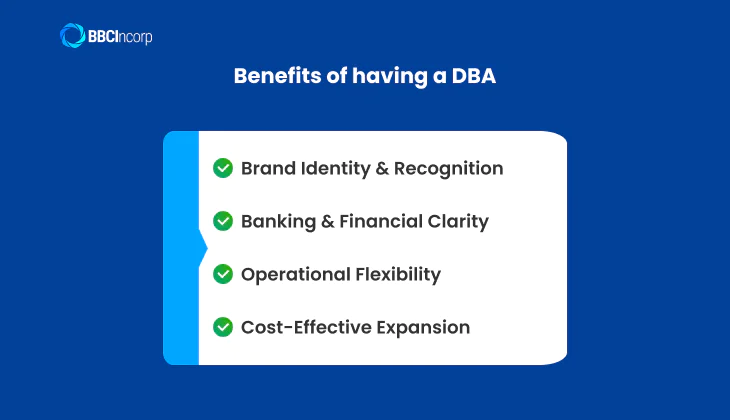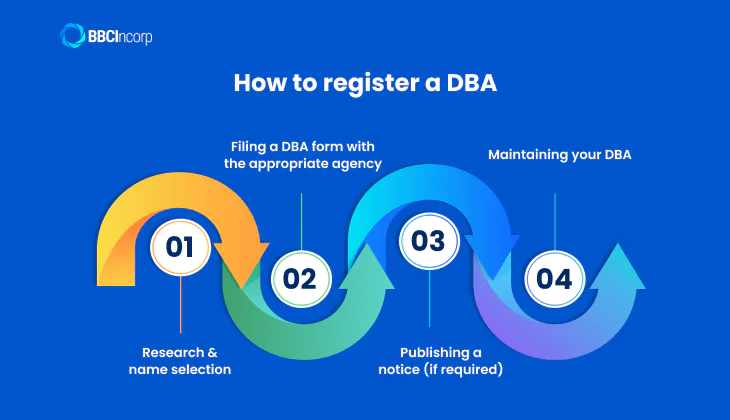
Table of Contents
If you’re starting a business, you may have come across the term DBA, short for “Doing Business As.” But what is a DBA, exactly? In simple terms, a DBA allows a business to operate under a name different from its legal, registered name. This is especially helpful for sole proprietors or LLCs that want to use a brand name without forming a new legal entity.
Understanding how DBAs work—and how to register one legally—is essential for entrepreneurs who want to establish credibility, stay compliant, and market their business more effectively.
What is a DBA in business?
A DBA, or “Doing Business As,” is a name that a business uses which differs from its legal, registered name.
For example, if Jane Smith runs a bakery legally registered as “Jane Smith Enterprises LLC” but wants to operate as “Sunrise Bakes,” she would file a DBA for that name. This flexibility is useful for branding or targeting different customer bases.
The DBA meaning in business does not imply the creation of a new legal entity. Whether you’re a sole proprietor or a registered LLC, your business structure and liabilities remain unchanged when operating under a DBA. This is important for entrepreneurs to understand, especially when expanding product lines or opening new locations.
A DBA is also known by other terms, such as a fictitious name, trade name, or assumed name. No matter what you call it, the DBA business meaning stays the same—it allows for name flexibility while maintaining your existing business structure.

So, what does DBA mean in business? It’s a legal alias. The business DBA meaning helps companies customize how they present themselves publicly, while the DBA name meaning emphasizes branding freedom, not legal independence.
When and why do you need a DBA?
Registering a “Doing Business As” (DBA) name can be a strategic move for businesses aiming to operate under a name different from their legal designation. This section explores practical scenarios where a DBA becomes essential and the benefits it offers across various business types.
When do you need a DBA?
A DBA (Doing Business As) becomes essential when your business operates under a name different from its legal designation. For instance, if you’re a sole proprietor named Jane Doe running a bakery called “Sweet Treats,” registering a DBA is necessary to legally use that business name. This requirement ensures transparency and compliance with local regulations.
Launching a new product line or brand under your existing business structure is another scenario where a DBA is beneficial. It allows you to market distinct products or services without forming separate legal entities.
For example, if “Sweet Treats” expands into catering services under the name “Gourmet Gatherings,” a DBA enables this diversification seamlessly.
Expanding into new markets often necessitates a DBA, especially when your original business name is already in use or doesn’t resonate with the new audience. A DBA provides the flexibility to adapt your branding to different regions or demographics without the complexities of establishing a new company.
Benefits of having a DBA
One of the primary benefits of a DBA is the ability to build a unique brand identity, which fosters consumer trust and recognition. Operating under a distinctive name can make your business more memorable and appealing to your target audience.
From a financial perspective, a DBA simplifies banking operations. Most banks require a DBA to open a business account under your trade name, facilitating smoother transactions and professional credibility. This separation also aids in clearer financial management and tax reporting.
Furthermore, a DBA offers operational flexibility, allowing you to manage multiple brands under one legal structure. This setup is cost-effective and efficient, enabling you to cater to diverse markets or product lines without the administrative burden of maintaining multiple entities.

In essence, understanding what a DBA does and how a DBA works is crucial for entrepreneurs seeking to expand their business horizons. It provides a strategic advantage in branding, compliance, and operational efficiency, making it a valuable tool in the business landscape.
How to get a DBA
Understanding the DBA registration process is essential for legally operating your business under a different name. This step-by-step guide breaks down how to get a DBA across most U.S. states, covering everything from researching your desired name to filing the necessary paperwork and maintaining your DBA over time.

Research and name selection
Before filing a DBA, it’s crucial to ensure your desired business name is available and doesn’t infringe on existing trademarks. Start by checking your state’s business name database to confirm the name isn’t already in use.
Additionally, search the U.S. Patent and Trademark Office (USPTO) database to avoid potential trademark conflicts. This step helps prevent legal issues and ensures your business name is unique and compliant with state regulations.
Filing a DBA form with the appropriate agency
Once you’ve confirmed name availability, you’ll need to file a DBA form with the appropriate government agency. Depending on your state and business structure, this could be the county clerk’s office or a state agency.
For example, in California, sole proprietors file with the county clerk, while corporations and LLCs may file at the state level.
The filing process typically requires:
- A completed DBA application form.
- Payment of a filing fee, which varies by jurisdiction but usually ranges from $10 to $100.
- Additional documentation, such as a certificate of good standing for existing entities.
Some states offer online filing options, while others may require in-person or mail submissions. It’s important to check with your local agency for specific requirements and procedures.
Publishing a notice (if required)
Certain states mandate that you publish a notice of your DBA registration in a local newspaper to inform the public of your business name change.
For instance, in California, you must publish the notice once a week for four consecutive weeks in a newspaper of general circulation. After publication, you’ll need to file an affidavit of publication with the appropriate agency as proof of compliance.
Maintaining your DBA
After successfully registering your DBA, it’s essential to maintain it to remain in good standing. Maintenance DBA requirements vary by state but generally include:
- Renewals: DBAs often need to be renewed every 1 to 5 years, depending on state regulations.
- Information Updates: If there are changes to your business address, ownership, or other pertinent details, you must update your DBA registration accordingly.
- Compliance: Ensure ongoing compliance with any state-specific requirements to avoid penalties or cancellation of your DBA.
Regularly reviewing your state’s guidelines and keeping your DBA information current will help maintain your business’s legal and operational integrity.
Whether you’re learning how to get a DBA, how to apply for a DBA, following these steps ensures you’re compliant and ready to operate under your chosen name.
Types of businesses that need a DBA
While not all businesses require a DBA, certain structures benefit from or are mandated to register one, depending on their operations and branding strategies.
Sole proprietorships
For sole proprietors, a DBA is often essential. Since a sole proprietorship is an unincorporated business owned by one individual, the legal business name defaults to the owner’s full name.
For example, if Sarah Lee operates a bakery named “Sweet Treats,” she must file a DBA to legally use that name.
This registration is crucial for opening business bank accounts, marketing, and establishing credibility with customers. Without a DBA, Jane would need to conduct all business under her personal name, which might not convey the desired brand image.
Registering a sole proprietorship DBA is typically straightforward and done at the county or state level, depending on local regulations.
It’s important to note that while a DBA allows for a different operating name, it doesn’t provide liability protection; the owner remains personally liable for business obligations.
LLCs and corporations
Limited Liability Companies (LLCs) and corporations might not be legally required to file a DBA if they operate under their registered names. However, they often opt to register DBAs to conduct business under different brand names without forming new entities.
For example, an LLC named “GreenTech Innovations LLC” might register a DBA as “EcoHome Solutions” to market a specific product line.
Registering a DBA for LLC or corporation DBA allows these entities to diversify their offerings and target different markets while maintaining a single legal structure.
It’s crucial to ensure that the chosen DBA name complies with state naming regulations and doesn’t imply a different business structure.
If a business owner decides to formalize their DBA into a separate legal entity, they might consider transitioning from a DBA to an LLC. For guidance on this process, refer to the article on how to change your DBA to an LLC.
Others business entities
While sole proprietors, LLCs, and corporations are the most common users of DBAs, other business types may also need one to operate legally and brand effectively. Below are examples of entities that often benefit from or require a DBA.
- Franchises
Franchisees often operate under the franchisor’s brand name, necessitating a DBA registration. For example, if an individual forms “ABC Ventures LLC” to open a “Subway” franchise, they must file a DBA to operate legally under the “Subway” name.
- Professional Limited Liability Companies (PLLCs)
PLLCs are formed by licensed professionals, such as doctors or lawyers, to provide services. If a professional limited liability company chooses to operate under a name different from its registered legal name, it must file a DBA. This is common when professionals want to brand their services uniquely while maintaining compliance with licensing regulations.
- Partnerships (e.g., Limited Liability Partnerships – LLPs)
Partnerships that wish to operate under a name not reflecting the partners’ names must register a DBA. This allows the partnership to establish a distinct brand identity and conduct business under a chosen name.
In each case, a DBA allows these businesses to create separate public identities while simplifying operations under one legal framework. This flexibility is vital for growth, branding, and legal compliance.
Legal and practical considerations of a DBA
While registering a DBA offers branding flexibility, it’s essential to understand its limitations and legal implications. Many business owners mistakenly assume that a DBA provides legal protection or changes their business structure—but it doesn’t. Knowing what a DBA does and doesn’t do is key to staying compliant and avoiding costly legal missteps.
What a DBA does not do
A DBA is not a business license. Registering a DBA name allows a business to operate under a different name, but it does not authorize the business to operate legally without the proper licenses or permits.
A DBA also doesn’t protect your business name from being used by others. It is not a trademark and offers no exclusive rights. To protect a name, a federal or state trademark registration is required.
Additionally, a DBA does not create a separate legal entity. The business remains tied to the individual or parent company that owns it. There is no liability protection, meaning the owner is still personally responsible for debts and legal obligations.
Compliance and legal obligations
DBA registration isn’t a one-time task. Most states require renewals every one to five years. If you fail to renew, your rights to use the DBA name can lapse, forcing you to stop using it in business.
You’re also required to keep records current. Any changes in ownership, address, or business structure must be updated with the registering authority. This ensures legal accuracy and helps avoid state penalties.
In states where a DBA is mandatory for businesses operating under a different name, failing to register can result in fines, inability to enforce contracts under that name, or even legal liability for misrepresentation.
To stay compliant, understand that a DBA is a name filing—not a legal shield. It’s a tool for branding, not a replacement for proper business licensing, legal protection, or entity formation. Always ensure your DBA registration aligns with your broader business obligations.
Conclusion
Understanding what is a DBA—a legal alias that lets you trade under a different name—can streamline branding, simplify market expansion, and keep your paperwork light. It’s commonly used by sole proprietors, LLCs, and corporations to establish a distinct business identity without forming a new legal entity.
Registering a DBA involves checking name availability, filing with the appropriate state or local agency, and, in some cases, publishing a notice in a local newspaper.
While a DBA offers branding advantages, it’s important to note that it doesn’t provide legal protection for the business name or limit personal liability. Therefore, ensuring compliance with state-specific requirements and understanding the limitations of a DBA are crucial steps in the process.
If you’re looking to establish a DBA or need assistance with the registration process, consider reaching out to BBCIncorp, a trusted provider of business incorporation services.
Frequently Asked Questions
Do I need a DBA if I use my own name?
If you’re operating a business under your own legal name—for example, “John Smith”—and not adding any descriptive words (like “Smith Consulting” or “John Smith Marketing”), then you typically don’t need a DBA.
However, the moment you add anything beyond your exact legal name, many states will require you to file for a DBA. This helps ensure clarity for customers and regulators about who owns the business.
Does a DBA count as a business license?
No, a DBA is not the same as a business license. A DBA (Doing Business As) simply allows a business to operate under a name different from its legal name.
It does not give permission to conduct business the way a business license does. You may still need a local, state, or federal license depending on your industry and location—even if you’ve registered a DBA.
Can one company have more than one DBA fictitious name?
Yes, a single business entity can register multiple DBAs. This is common for businesses that want to run multiple brands, product lines, or services under one legal structure (like an LLC or corporation).
Each DBA must be filed and maintained according to state or local requirements, and it gives the appearance of separate business identities while still being legally tied to the parent company.
Disclaimer: While BBCIncorp strives to make the information on this website as timely and accurate as possible, the information itself is for reference purposes only. You should not substitute the information provided in this article for competent legal advice. Feel free to contact BBCIncorp’s customer services for advice on your specific cases.
Industry News & Insights
Get helpful tips and info from our newsletter!
Stay in the know and be empowered with our strategic how-tos, resources, and guidelines.





